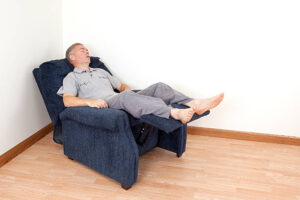Can Sleeping in a Recliner Help with Sleep Apnea?
August 26, 2024
 Healthcare professionals recommend receiving 7 to 9 hours of sleep every night to stay healthy and feel your best. However, if you have sleep apnea, you may spend the night tossing and turning. Frequent breathing disturbances can prevent you from getting the rest you need. Research has shown that sleeping in a recliner can help you breathe better. Here’s why you may want to consider sleeping at an incline.
Healthcare professionals recommend receiving 7 to 9 hours of sleep every night to stay healthy and feel your best. However, if you have sleep apnea, you may spend the night tossing and turning. Frequent breathing disturbances can prevent you from getting the rest you need. Research has shown that sleeping in a recliner can help you breathe better. Here’s why you may want to consider sleeping at an incline.
What Causes Obstructive Sleep Apnea?
Obstructive sleep apnea is the most prevalent form of the breathing disorder. As your muscles relax when drifting off to sleep, the soft tissues in the back of your mouth or your tongue may create an obstruction in your upper airway. This can cause you to stop breathing potentially hundreds of times per night. Each event interrupts your sleep cycle and deprives your body of oxygen. Not only can this affect your energy levels, but your physical and mental health can suffer, too.
Your Sleep Position Matters
Your sleep position can increase your risk of breathing disruptions. Sleeping on your back is known to cause more sleep apnea episodes. Sleeping on your side can reduce occurrences, but a recliner can also be helpful.
A 2017 study found that an elevated sleeping position can have a positive effect on sleep apnea sufferers. Researchers found that a 7.5-degree elevation angle can improve OSA symptoms. Some patients experience a 30% reduction in breathing disruptions. Additional studies have found that a 30-60-degree angle also reduces sleep apnea symptoms, which is similar to the position of a reclining chair.
Treating Sleep Apnea
Changing your sleep position can improve sleep apnea symptoms, but it’s not a substitute for treatment. A CPAP machine is the most traditional method of treatment. Pressurized air is delivered through a mask worn over your mouth or nose to prevent pauses in breathing. Although it is effective, it can be bothersome for some patients.
As an alternative, patients with mild-to-moderate sleep apnea may benefit from an oral appliance. The custom-fit device trains your jaw and tongue to rest in a more comfortable position to prevent them from blocking your airway.
With the right treatment and simple changes at home, like sleeping at an incline. You can receive the quality of sleep you need to support your wellness and feel your best.
About Dr. Ivan Paskalev
Dr. Paskalev turned his focus to dental sleep medicine after earning his dental degree. He offers the latest solutions to treat snoring and sleep apnea. Dr. Paskalev is a proud member of several professional organizations, including the American Academy of Dental Sleep Medicine. Request an appointment through his website or contact his office at (541) 246-8284.

